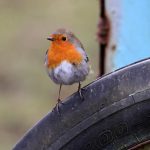

Study to explore how urban wildlife are responding to Covid-19 lockdown

People in Orkney’s towns are being asked to keep an eye out on any unusual behaviour they spot amongst wildlife on the streets or in their gardens by Keele University in Staffordshire.
The university is currently carrying out research exploring how lockdowns across the world due to the COVID-19 outbreak are impacting the lives of urban animals, and are hoping people in the county’s towns can help by answering their online survey.
Across the world, the COVID-19 outbreak has led governments to declare a period of social isolation resulting in cities and town centres becoming quieter whilst residential gardens and outdoor spaces are getting busier. For urban wildlife, which includes mammals and birds living alongside people in towns, this will affect levels of disturbance from humans and food availability.
In recent weeks there have already been reports of animals adapting to the reduced human activity including Kashmiri goats roaming around Llandudno, North Wales, troops of monkeys in Singapore, wild boars in cities across Europe and Coyotes wandering streets during daylight hours in the US.
Lead researcher Professor Dawn Scott, an expert in Mammal Ecology and Conservation, will use this unprecedented time to try to collect information and answer the study’s overarching question – How have urban animals responded to changes in human activity during the COVID-19 lockdown?
The research will collect records on any observations of unusual animal behaviour during the lockdown, determine the effects of reduction in human activity in city and town centres on urban wildlife, and the effects increased human activity in gardens and outdoors space is having. The data from the survey will then be combined with other data from media searches to produce a report on the response of urban animals to lockdown across the globe.
Professor Scott, head of the School of Life Sciences at Keele University, said: “Urban animals have been able to adapt to our landscape and live alongside towns, cities and suburbs so we know they are already highly adaptable. This flexibility in behaviour means they can usually quickly respond to changing conditions, including the absence of humans, which is happening during the lockdown.
“Across the world we have seen reports of animals roaming cities and in locations that they wouldn’t normally be seen during the day. Social isolation is an opportunity for many to learn more about nature and how we can support it. We’re asking people to take part in our study and help us discover how urban animals are responding due to our change in behaviour.”
To find out more and take part in the study visit: www.keele.ac.uk/wildlifestudy